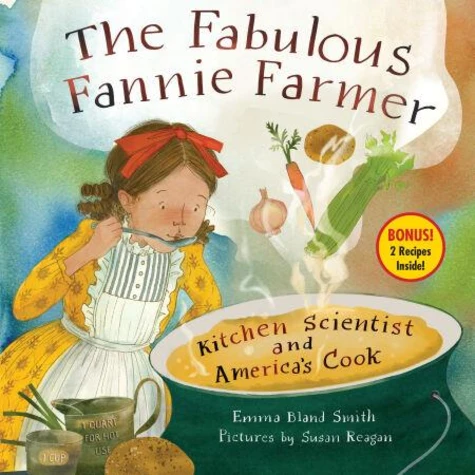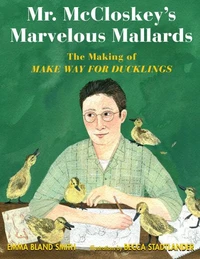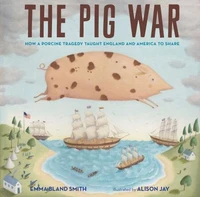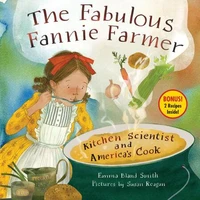- Accueil /
- Emma Bland Smith
Emma Bland Smith

Dernière sortie
The Fabulous Fannie Farmer
ALSC Notable Children's BookCCBC Choices 2025A NSTA-CBC Best STEM Book2025 Texas Topaz List2025 Rise: A Feminist Book Project TitleFannie Farmer, America's most famous cooking teacher, discovers that precise measurements are a recipe for cooking success in this STEAM picture book that includes two of her classic recipes.? School Library Journal, starred review? Youth Services Book Review, starred reviewWhen Fannie Farmer learned to cook in the late 1800s, recipes could be pretty silly.
They might call for "a goodly amount of salt" or "a lump of butter" or "a suspicion of nutmeg." Girls were supposed to use their "feminine instincts" in the kitchen (or maybe just guess). Despite this problem, Fannie loved cooking, so when polio prevented her from going to college, she became a teacher at the Boston Cooking School. Unlike her mother or earlier cookbook writers, Fannie didn't believe in feminine instincts.
To her, cooking was a science. She'd noticed that precise measurements and specific instructions ensured that cakes rose instead of flopped and doughnuts fried instead of burned. Students liked Fannie's approach so much that she wrote a cookbook. Despite skepticism from publishers, Fannie's book was a recipe for success. Written with humor and brought to life with charming illustrations, this book explores the origins of Fannie Farmer's quintessentially American cookbook.
A cookbook that was beloved because it allowed anyone to make tasty things, with no guessing, no luck-and certainly no feminine instincts-required.
They might call for "a goodly amount of salt" or "a lump of butter" or "a suspicion of nutmeg." Girls were supposed to use their "feminine instincts" in the kitchen (or maybe just guess). Despite this problem, Fannie loved cooking, so when polio prevented her from going to college, she became a teacher at the Boston Cooking School. Unlike her mother or earlier cookbook writers, Fannie didn't believe in feminine instincts.
To her, cooking was a science. She'd noticed that precise measurements and specific instructions ensured that cakes rose instead of flopped and doughnuts fried instead of burned. Students liked Fannie's approach so much that she wrote a cookbook. Despite skepticism from publishers, Fannie's book was a recipe for success. Written with humor and brought to life with charming illustrations, this book explores the origins of Fannie Farmer's quintessentially American cookbook.
A cookbook that was beloved because it allowed anyone to make tasty things, with no guessing, no luck-and certainly no feminine instincts-required.
ALSC Notable Children's BookCCBC Choices 2025A NSTA-CBC Best STEM Book2025 Texas Topaz List2025 Rise: A Feminist Book Project TitleFannie Farmer, America's most famous cooking teacher, discovers that precise measurements are a recipe for cooking success in this STEAM picture book that includes two of her classic recipes.? School Library Journal, starred review? Youth Services Book Review, starred reviewWhen Fannie Farmer learned to cook in the late 1800s, recipes could be pretty silly.
They might call for "a goodly amount of salt" or "a lump of butter" or "a suspicion of nutmeg." Girls were supposed to use their "feminine instincts" in the kitchen (or maybe just guess). Despite this problem, Fannie loved cooking, so when polio prevented her from going to college, she became a teacher at the Boston Cooking School. Unlike her mother or earlier cookbook writers, Fannie didn't believe in feminine instincts.
To her, cooking was a science. She'd noticed that precise measurements and specific instructions ensured that cakes rose instead of flopped and doughnuts fried instead of burned. Students liked Fannie's approach so much that she wrote a cookbook. Despite skepticism from publishers, Fannie's book was a recipe for success. Written with humor and brought to life with charming illustrations, this book explores the origins of Fannie Farmer's quintessentially American cookbook.
A cookbook that was beloved because it allowed anyone to make tasty things, with no guessing, no luck-and certainly no feminine instincts-required.
They might call for "a goodly amount of salt" or "a lump of butter" or "a suspicion of nutmeg." Girls were supposed to use their "feminine instincts" in the kitchen (or maybe just guess). Despite this problem, Fannie loved cooking, so when polio prevented her from going to college, she became a teacher at the Boston Cooking School. Unlike her mother or earlier cookbook writers, Fannie didn't believe in feminine instincts.
To her, cooking was a science. She'd noticed that precise measurements and specific instructions ensured that cakes rose instead of flopped and doughnuts fried instead of burned. Students liked Fannie's approach so much that she wrote a cookbook. Despite skepticism from publishers, Fannie's book was a recipe for success. Written with humor and brought to life with charming illustrations, this book explores the origins of Fannie Farmer's quintessentially American cookbook.
A cookbook that was beloved because it allowed anyone to make tasty things, with no guessing, no luck-and certainly no feminine instincts-required.
Les livres de Emma Bland Smith

Mr. McCloskey's Marvelous Mallards. The Making of Make Way for Ducklings
Emma Bland Smith, Becca Stadtlander
E-book
11,76 €

The Pig War. How a Porcine Tragedy Taught England and America to Share
Emma Bland Smith, Alison Jay
E-book
11,76 €
